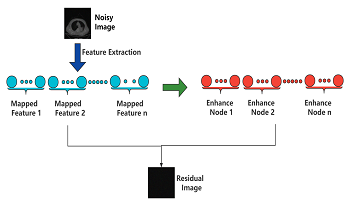
Image denoising plays an important role in CT sampling. Although good results have been achieved by filter-based, model-based and deep learning-based denoising methods, there are still many demanding constraints in real applications. In order to improve accuracy and efficiency, a residual learning network based on broad learning system (ReBLS) is proposed. First, features are extracted from the noisy images to generate a feature node layer. Subsequently, through a random matrix after orthogonal normalization, the feature nodes are reinforced into an enhanced node layer. Finally, the noise will be removed by the residual network. Compared with commonly used deep learning scheme, the broad learning replaces depth with expansion in breadth, the training and process time of broad learning is much shorter. Meanwhile, the learning of residuals can simplify the learning process and enhance the feature extraction. Experiments on the open dataset fully prove the accuracy and efficiency by comparing with five state-of-the-art denoising methods.
Jin Huang, Lei Wang, Zhouqi Liu, Yuwei Wang, Xinping Guo, Tianqi Cheng, Cong Liu, ChunXiang Liu, "ReBLS Denoiser: An Effective Denoiser based on the Residual Broad Learning System for CT Images" in Journal of Imaging Science and Technology, 2023, pp 030401-1 - 030401-7, https://doi.org/10.2352/J.ImagingSci.Technol.2023.67.3.030401
 Find this author on Google Scholar
Find this author on Google Scholar Find this author on PubMed
Find this author on PubMed

